Whether you’re using your hose to fill up your kiddie pool or water your vegetable garden, you might find yourself wondering: what in the world could this hose be leaching into my water?
And you may be right to wonder because many standard garden hoses that you’d grab from big box stores like Walmart or Home Depot contain toxic chemicals like lead or phthalates.
So in this article, I’ll discuss why typical garden hoses are problematic, what to look for in safer options, and my 3 recommended brands.
Safest Garden Hoses In a Nutshell:
- A 2016 study of garden hoses sold at common retailers found high levels of phthalates, BPA, lead, and other heavy metals.
- When searching for the safest garden hose for your home, you’ll want to look for hoses that are:
- Made out of polyurethane (PU) instead of PVC
- Labeled as “Drinking Water Safe”
- Prop 65 compliant
- I’ve recommended 3 of the safest garden hose brands below.
Table of Contents
- Toxic Chemicals Found in Garden Hoses
- Look For a Hose That’s Drinking Water Safe AND Phthalate-Free
- The Best Non-Toxic Garden Hoses
- Terrain Drinking Water Safe Hose
- Eley Durable Garden Hose
- Water Right Garden Hose
- The AquaArmor from Gilmour
- What About a Non-Toxic Garden Hose Nozzle?
- How Else to Reduce Toxin Exposure from Garden Hoses
This guide contains affiliate links, which means we may earn a commission if you decide to make a purchase. As always, we only make recommendations that are genuine.
Toxic Chemicals Found in Garden Hoses
As I mentioned, most typical garden hoses contain potentially toxic materials including:
- PVC
- Lead
- Other heavy metals
- Phthalates
- Bisphenols (like BPA)
In fact, back in 2016, The Ecology Center in Ann Arbor tested 32 garden hoses from national retailers. The study found:
- Elevated levels of lead, bromine, antimony, and phthalates in PVC hoses.
- 29% had elevated levels of lead ranging from 100 ppb-68,000 ppb. (The EPA limit on drinking water is 15 ppb.)
- Recycled e-waste vinyl was used in making the hoses that had the highest levels of bromine, lead, antimony, and tin.
- 75% of PVC hoses contained phthalates.
- BPA and lead were found to leach from some of the hoses into the water.
Now for some good news. The study also notes that manufacturers are shifting to safer materials (thanks in part to consumer demand) and reduced levels of lead were noted between 2011 and 2015. 👏
The chemicals listed above all come with their own potential problems, from cancer to infertility, and more. Although they’re pretty darn difficult to avoid completely, most of us want to do what we can to at least reduce our exposure (and that of our kids, pets, and other loved ones).
And for that: I suggest using a garden hose made out of PU and labeled as “Drinking Water Safe.”
According to the results of the above study, hoses made out of polyurethane (PU) instead of PVC and labeled “Drinking Water Safe” contained a much lower amount of toxic chemicals.
Look For a Hose That’s Drinking Water Safe AND Phthalate-Free
Here are a few things to look for in a safer garden hose for your home:
- Polyurethane (PU), instead of PVC
- Meets FDA and NSF standards for drinking water safety
- Labeled as “phthalate-free”
- Labeled as “BPA-free” (and other bisphenols if possible! BPS, BPF, etc.)
- UV-stabilized (to prevent excess breakdown and leaching of chemicals when sitting in the sun)
- Made in the USA
- Meets California Prop 65 standards (which ensures lead and phthalate levels are as low as possible)
As you can see in the Ecology Center study, the hoses that were labeled as “Drinking Water Safe” were free from elevated levels of lead, bromine, and antimony, but about 30% of them still contained phthalates.
Therefore, your best bet is to choose a garden hose that is BOTH “Drinking Water Safe” AND “phthalate-free.”
Lastly, a couple of quick notes before you get shopping:
- Just because something is labeled as “lead-free” doesn’t necessarily mean there is literally zero lead. In order to be able to label something as “lead-free,” it really just has to have very low lead. While that’s not ideal, I definitely still recommend looking for the “lead-free” label (as well as CA Prop 65 compliance). That’s still the best option and will help you minimize exposure to lead in garden hoses.
- Similarly, just because something is labeled as “BPA-free” doesn’t necessarily mean it’s free from all bisphenols. Again, this is not ideal, but I still recommend looking for this label because it’s a better option!
The Best Non-Toxic Garden Hoses
Now that you know what we’re looking for, here are our picks for the safest non-toxic garden hoses:
Terrain Drinking Water Safe Hose
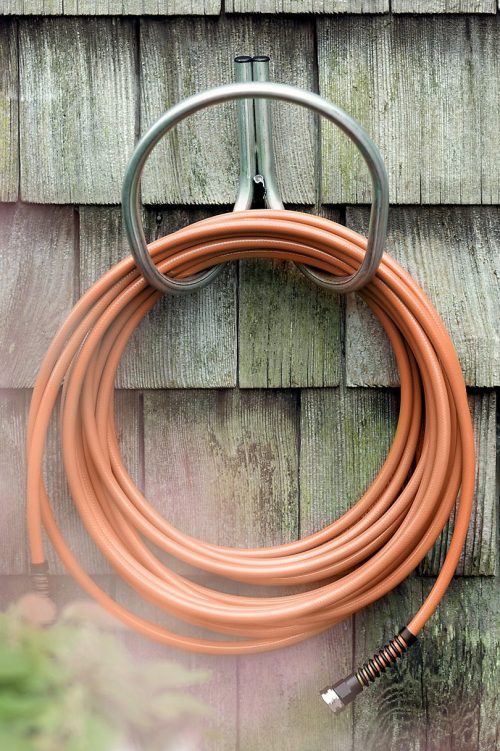
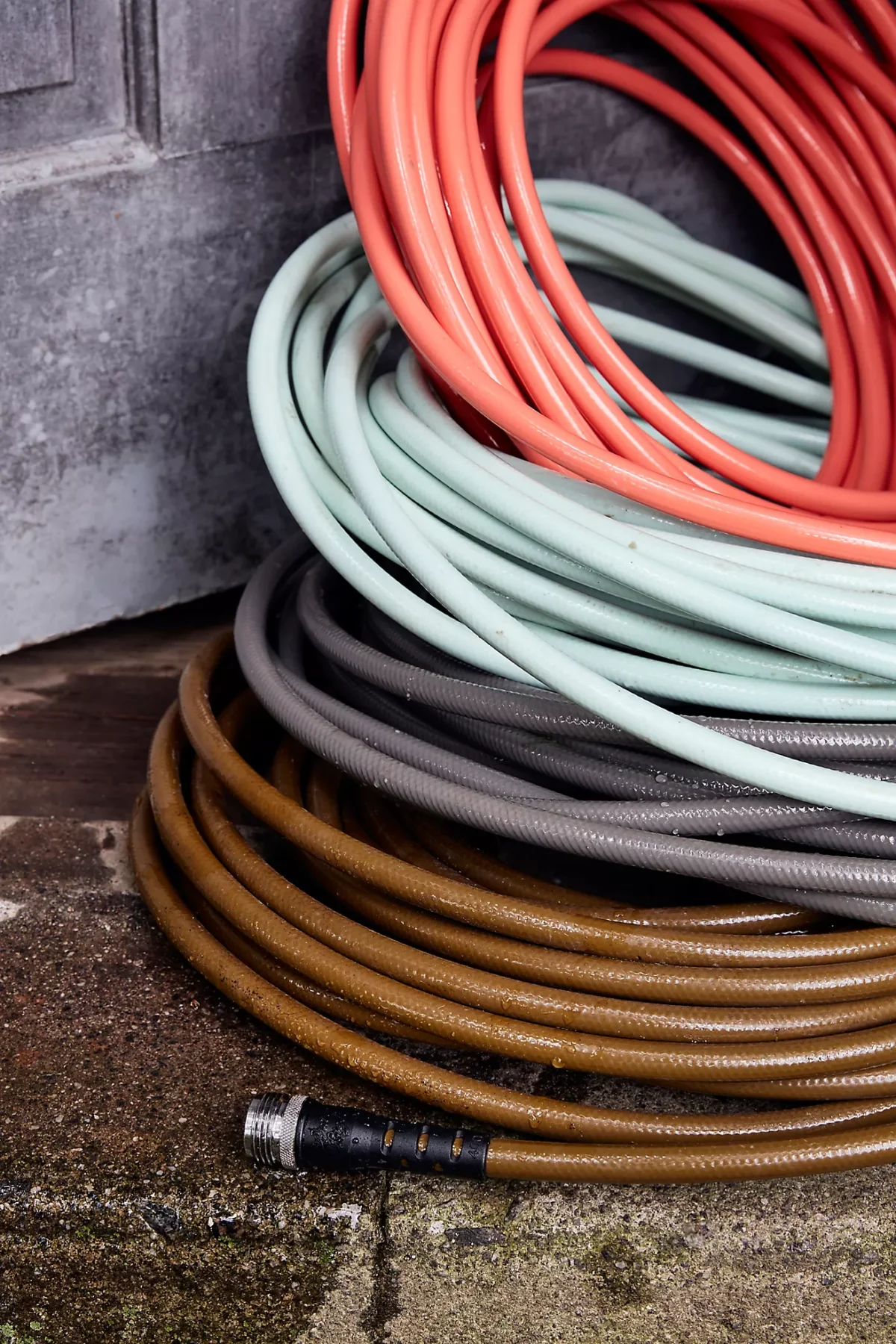
Lengths: 50 or 100 feet
Colors: Grey or white
Price: $88 – $138
Available in a couple of different colors and lengths (50 feet or 100 feet), this lightweight drinking water safe garden hose from Terrain is:
- Made out of polyurethane
- Free from BPA and phthalates
- Made without lead
- Made in the USA
- Drinking water safe
Eley Durable Garden Hose
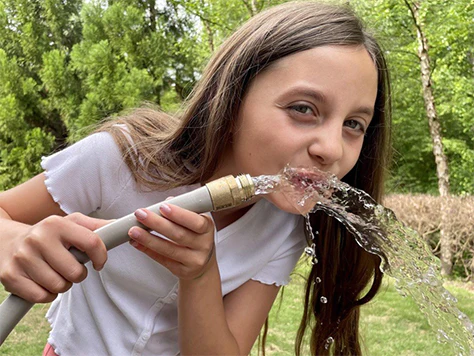
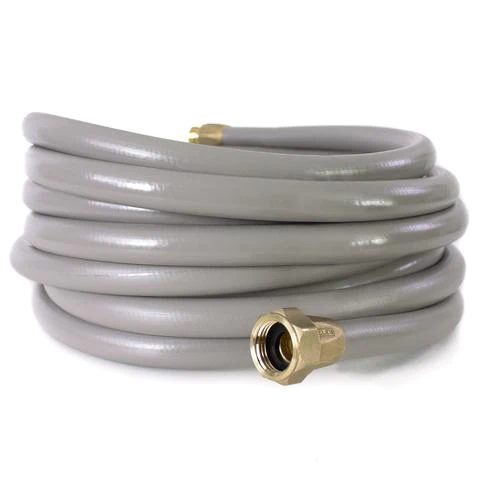
Lengths: 6.5 to 200 feet (many different lengths to choose from)
Colors: Grey
Price: $35-$338
This hose is a great choice for you if you need an extra-long or extra-short hose… They have 10 different lengths to choose from!
It’s also:
- Made out of FDA and NSF grade polyurethane instead of PVC
- Drinking water safe
- Made without lead, phthalates, or BPA
- Made in the USA
- Abrasion, cut, puncture & tear resistant
- Comes with a 10-Year No-Leak Warranty
They also have a drinking water safe hose nozzle to go with it.
Water Right Garden Hose
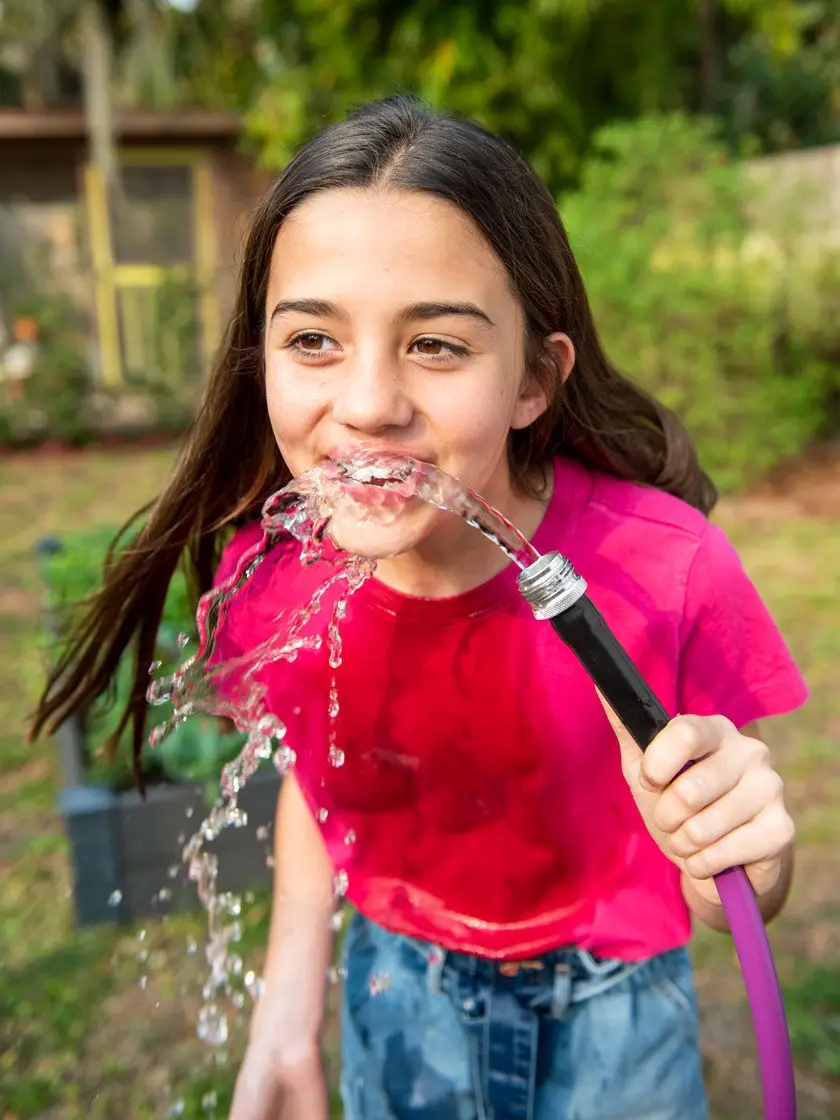
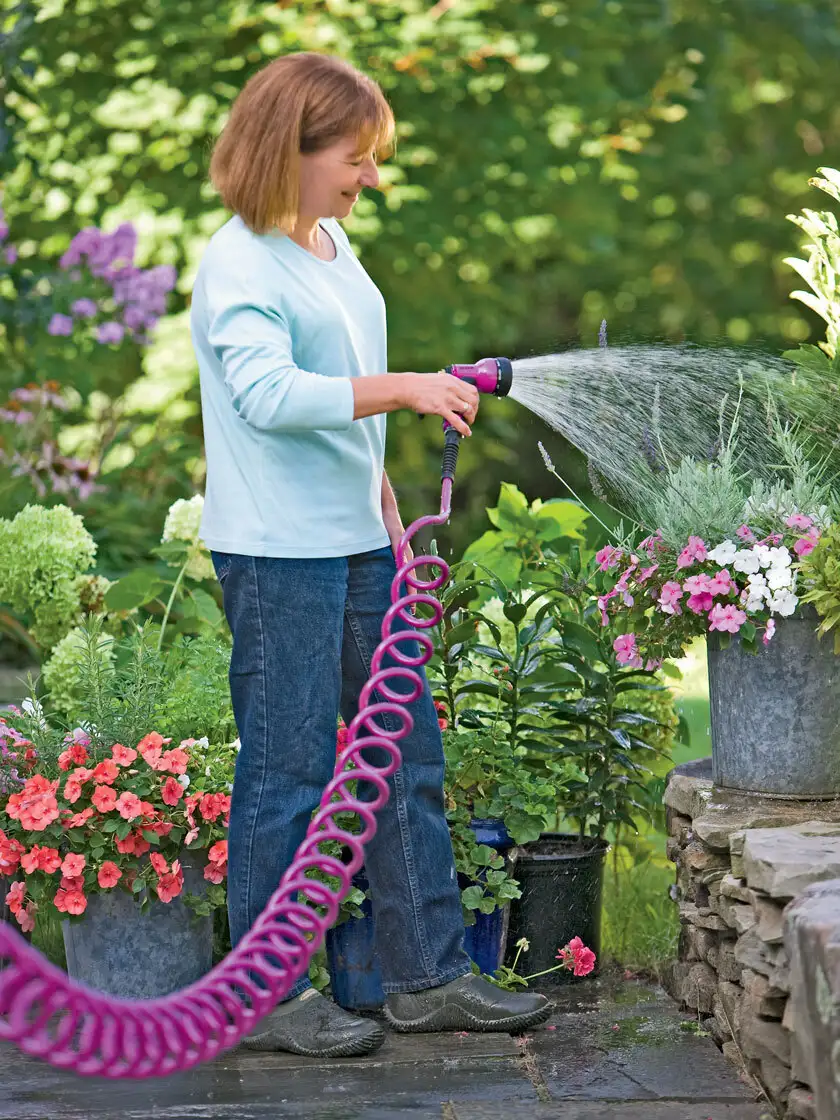
Lengths: 25, 50, 100 ft options
Color: A variety of color options
Price: $25 – $200
This is one of the most popular brands for safe, non-toxic garden hoses. Key features include:
- Made from polyurethane (PU) which is better than PVC
- Meets FDA, EPA, and NSF standards for drinking water safety
- Meets standards to be labeled as “lead-free”
- Free from BPA
- Made in the USA
- Kink-resistant
- Comes with a 5-year warranty
Plus, Water Right has a wide variety of options, too. They carry hoses that come in various lengths and widths, soaker hoses, and coil hoses. And fun colors, too!
There several ways for you to buy Water Right hoses:
The AquaArmor from Gilmour
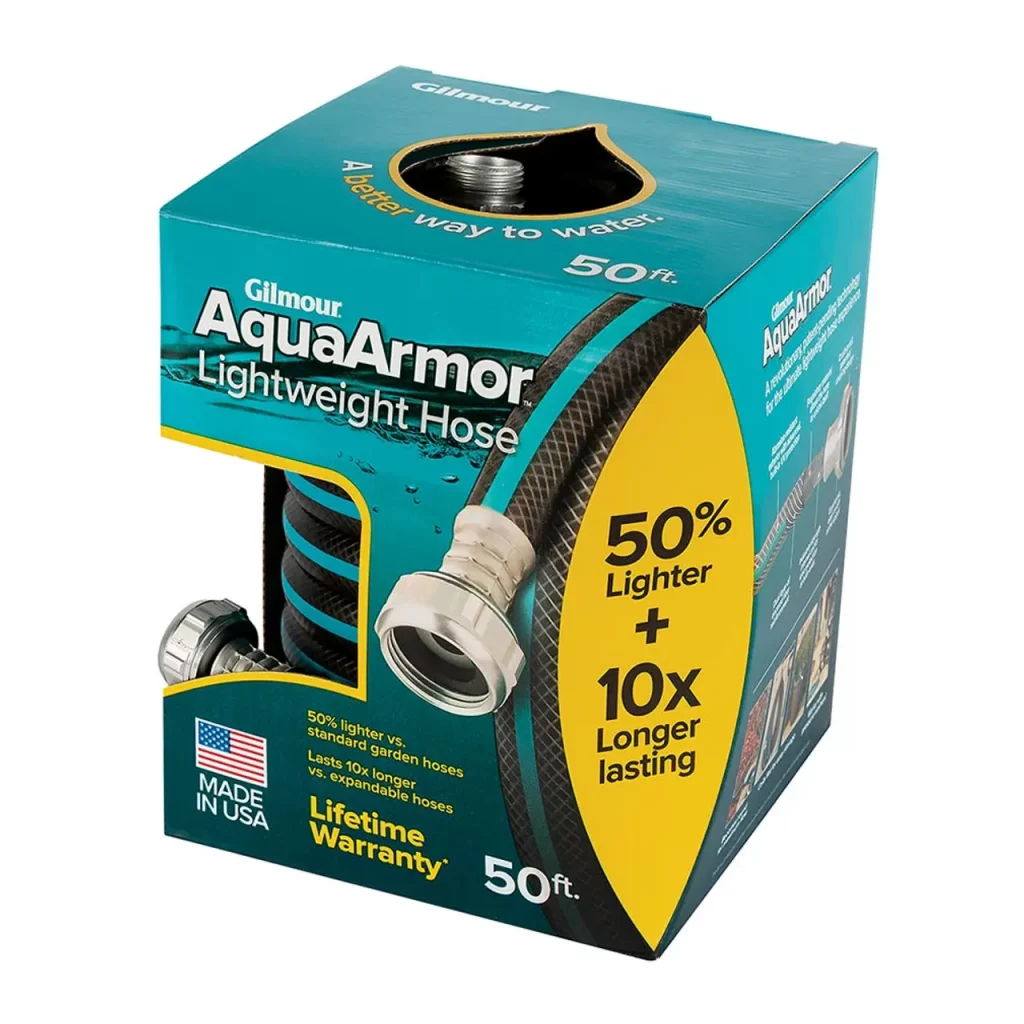
Lengths: 50 and 100 feet
Colors: Basic
Price: $40-63
Note: Not all Gilmour hoses are PVC-free and/or drinking water safe, but the AquaArmor one is
Gilmour is a hose brand you can find at big box stores like Home Depot. Not all of their hoses are PVC-free and/or drinking water safe, but their AquaArmor line is made from TPE, which is another kind of plastic PVC alternative that is free from lead and phthalates.
The AquaArmor hose comes in a 50′ and 100′ version and is lighter weight than most conventional hoses so it’s easier to move around your yard or garden. These hoses are:
- Drinking water safe
- Free from BPA
- Phthalate-free
- Lead-free
- PVC-free
- Made in the USA
You can buy a Gilmour AquaArmor hose at:
What About a Non-Toxic Garden Hose Nozzle?
Although the material of your hose nozzle isn’t AS important simply due to the size and the fact that the water isn’t sitting in the nozzle, it’s still something to consider.
You’ll want to look for many of the same labels that you did for your hose:
- “Lead-Free”
- “Phthalate-Free”
- “Drinking Water Safe”
These are pretty hard to find, to be honest, but I did find ONE non-toxic sprayer that meets the criteria! Again, these nozzles probably aren’t going to be 100% perfect, but the goal here is just to do what you can!
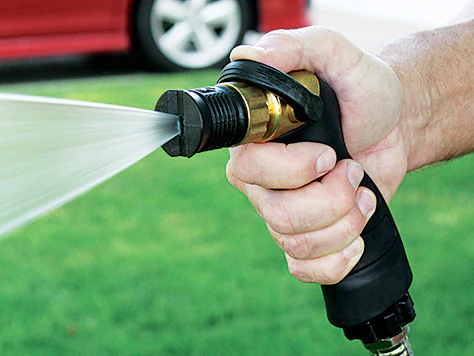
How Else to Reduce Toxin Exposure from Garden Hoses
No matter what kind of hose you decide on, here are a couple last tips for reducing your exposure to potential toxins through your garden hose:
- Don’t drink or use water that’s been sitting in the hose. Let the water run through the hose for a couple of minutes before taking a drink, filling a pool, or watering your garden.
- Don’t let the hose sit in the sun for too long. When it’s not in use, put it in the garage, shed, or at the very least, in a shady spot.
Are Rubber Garden Hoses Safe?
Synthetic rubber hoses come with many of the same problems that PVC/plastic ones do, so I do not recommend them. Natural rubber hoses, on the other hand, are generally a safer option (if you can find one!).
What About Stainless Steel Garden Hoses?
Stainless steel garden hoses have a few benefits:
- They’re less likely to include things like phthalates (although the lining could still include these chemicals)
- Are less likely to break down in the sunlight
- Are going to generally be more durable
However, there are some downsides:
- Stainless steel garden hoses are more likely to contain toxic lead and heavy metals.
- You’ll have to search a little harder to find a stainless steel drinking water safe hose.
I don’t recommend drinking from a stainless steel garden hose unless it is explicitly “Drinking Water Safe” and meets Prop 65 standards for lead safety.
If you or your kids are going to be wading in the water from your hose, watering your vegetable garden with it, and/or drinking your hose water at all, I definitely recommend investing in a high-quality, drinking water safe hoses. This can help reduce exposure to toxic chemicals like PVC, phthalates, lead, and other heavy metals.
If you found this guide helpful and would like to get more tips, recommendations, new, and more delivered to your inbox once a week, sign up for Filtered Fridays!
More Guides to Non-Toxic Summer Fun
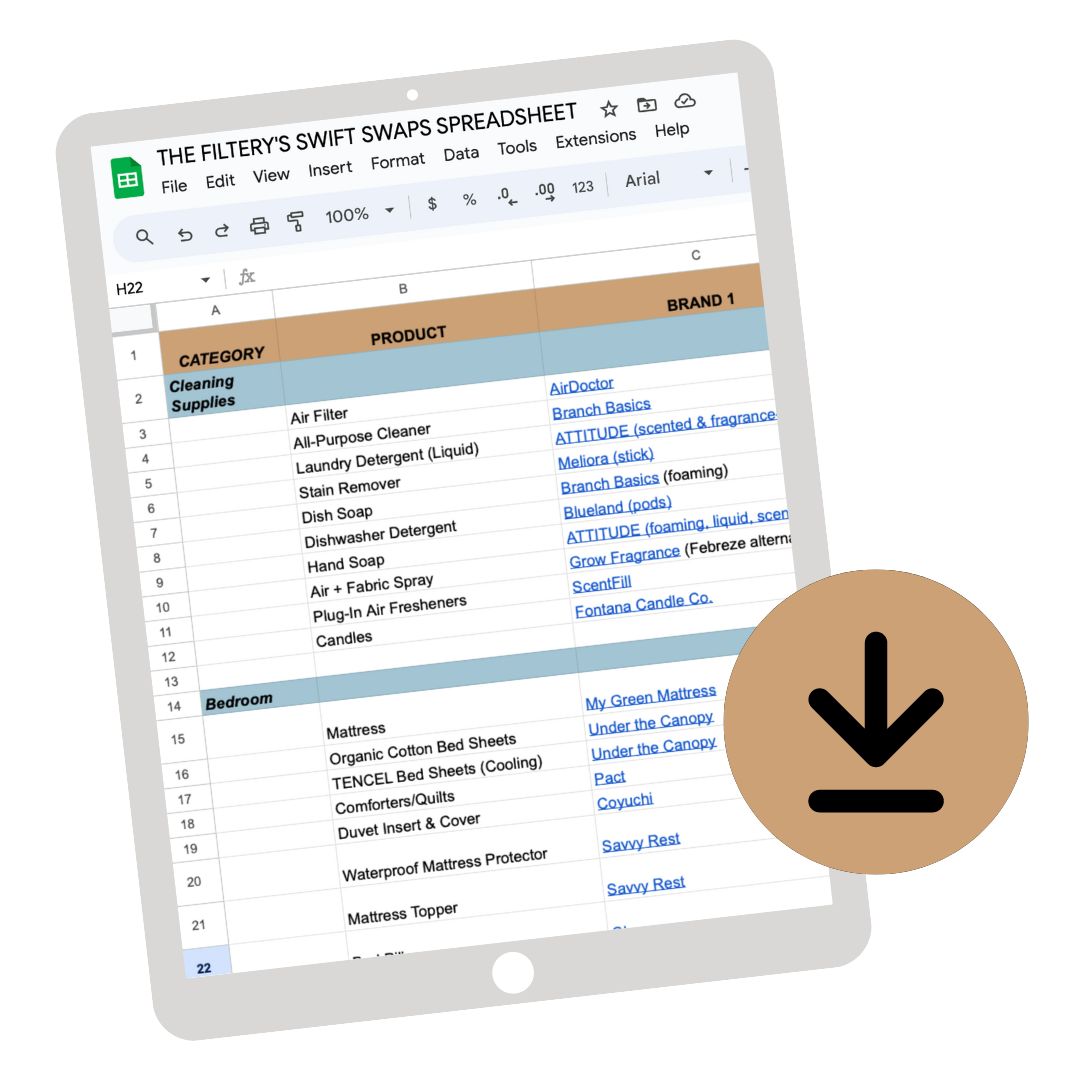
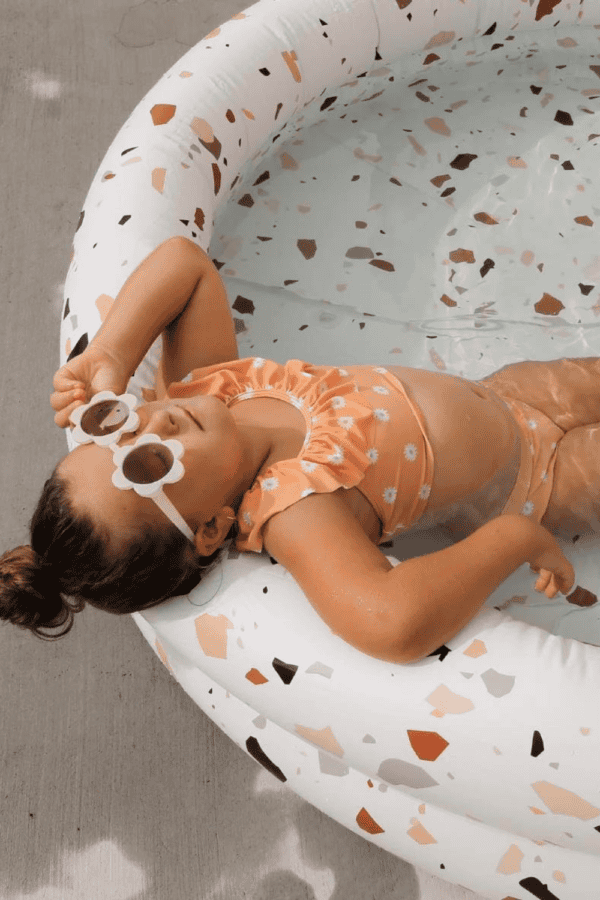
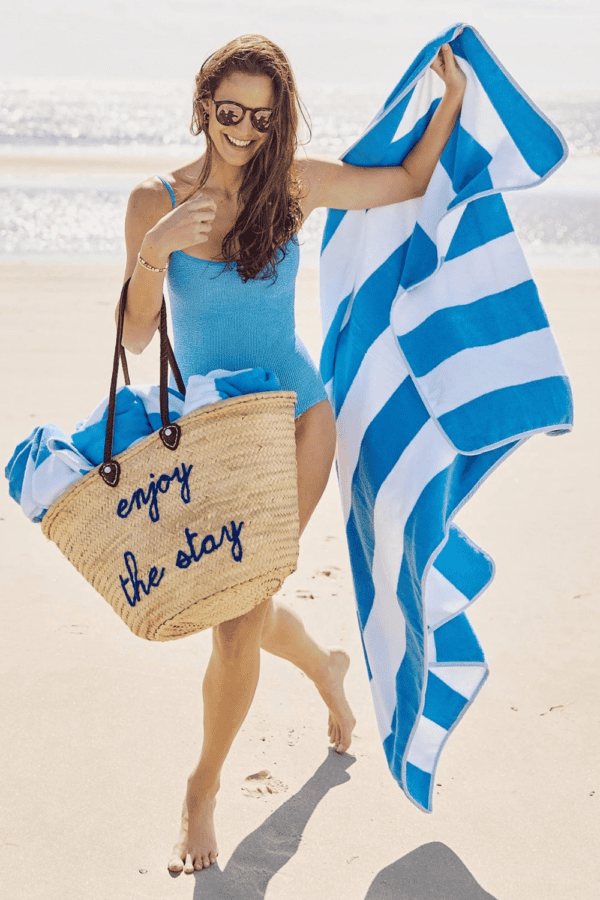
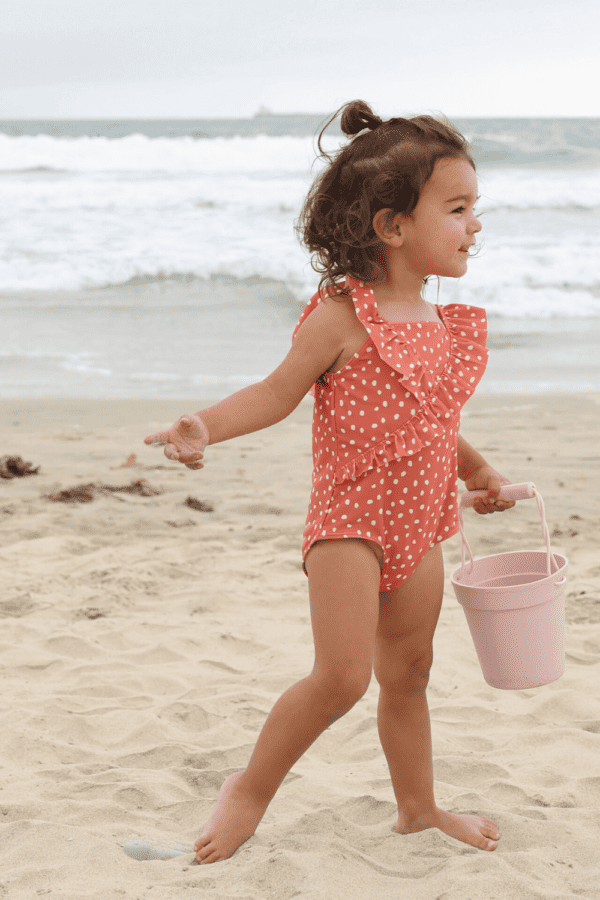
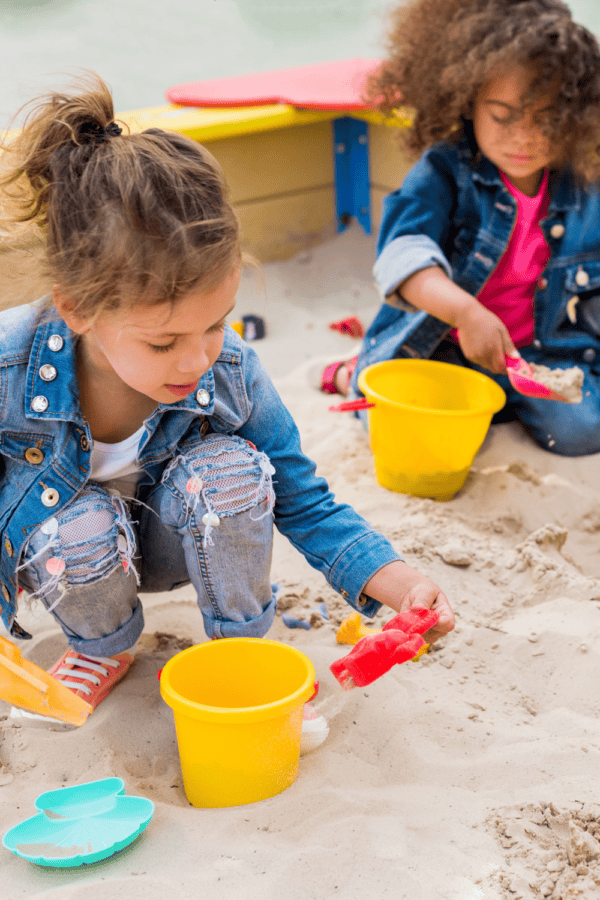
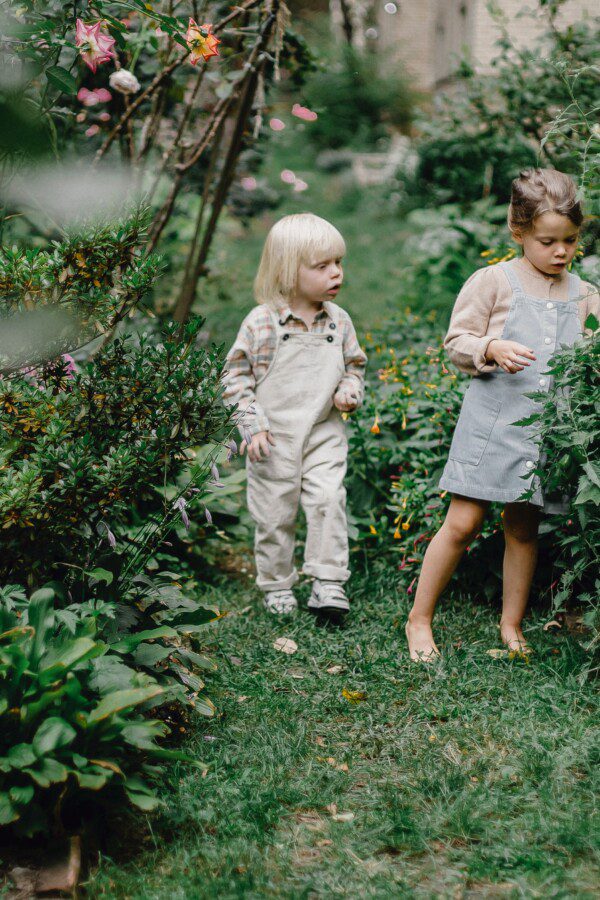
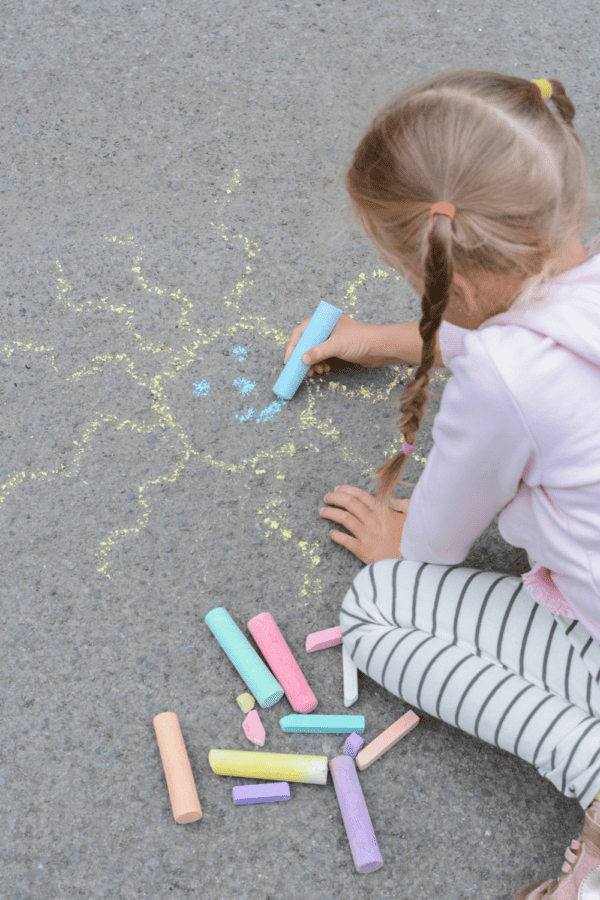
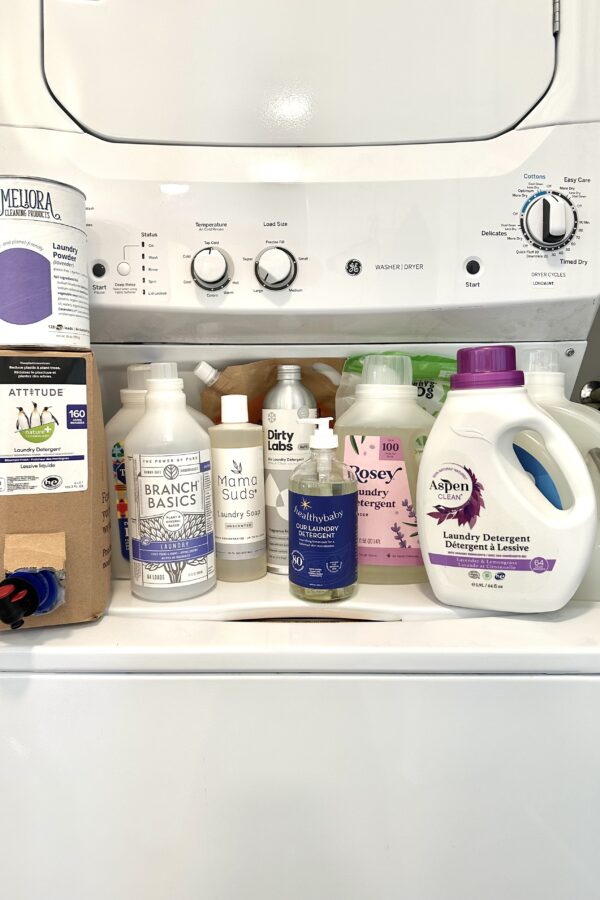
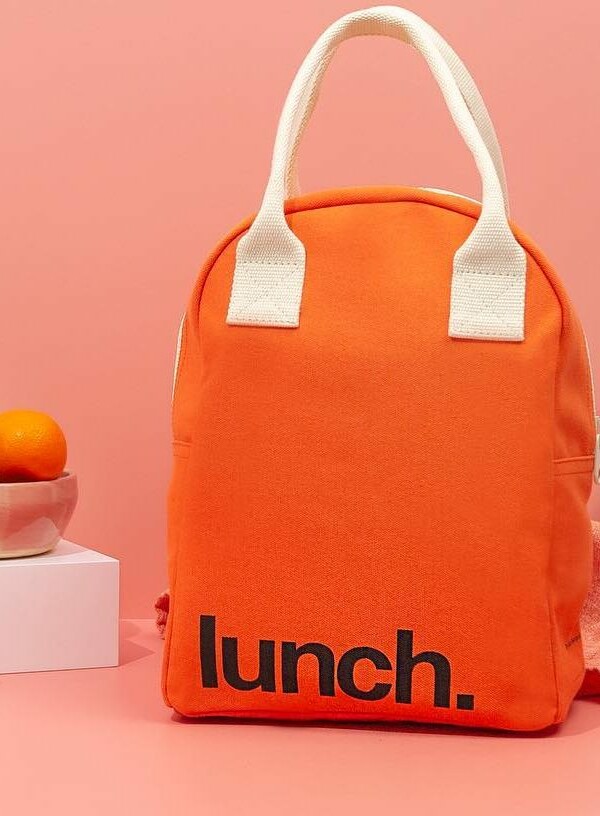
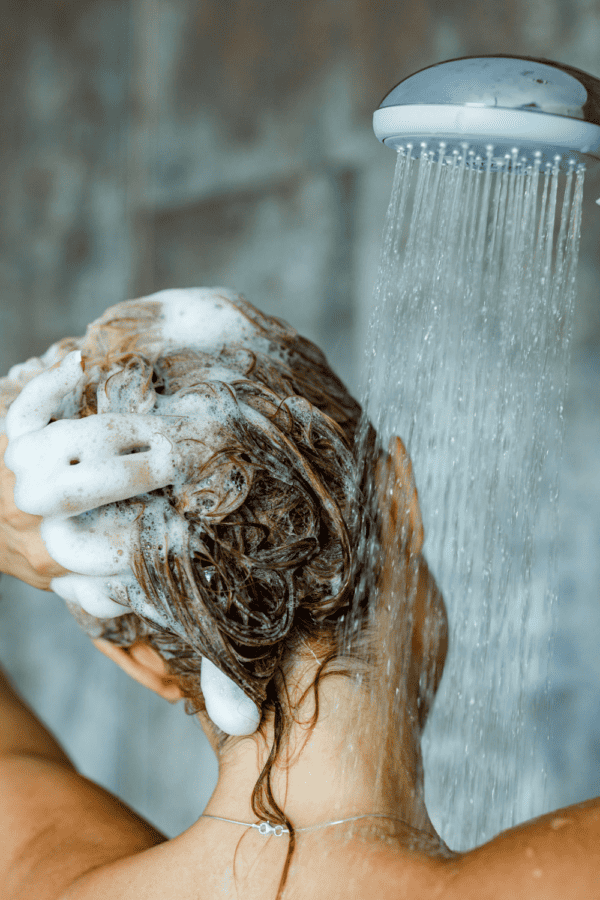
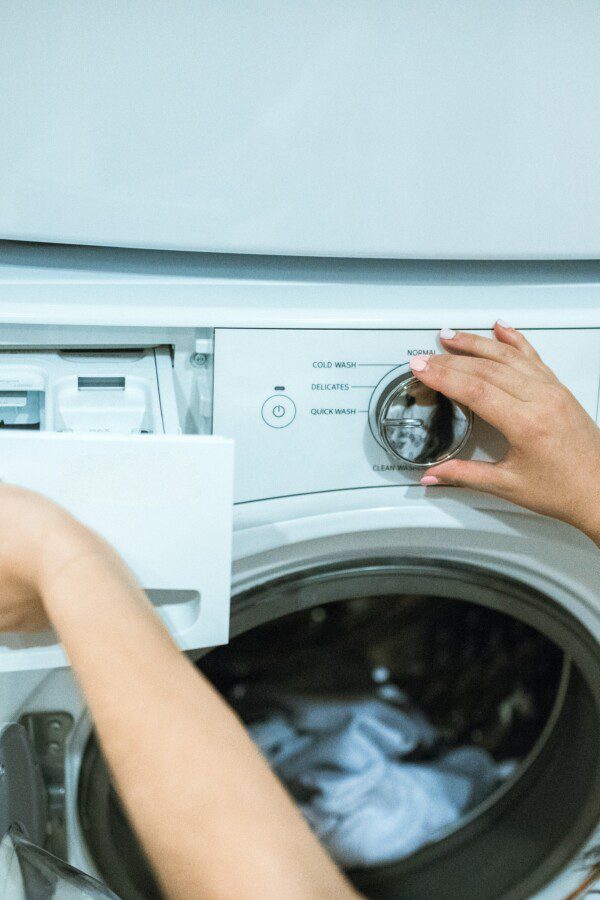
Really appreciate your own research. I too am having difficulty finding safe products. We ended up buying parts from the Eley site (nozzles, fixtures, etc.).
I need to buy two 50′ garden hoses and want to select hoses that are PFAS-free. I cannot find a guide to PFAS-free hoses online. Do you know of any tests that have been done? Thank you.
Hi Tracy, unfortunately, I haven’t seen any testing on PFAS and garden hoses to date. It’s possible that manufacturers actually don’t intentionally add PFAS to garden hoses because the rubber and/or plastic is itself non-porous. (PFAS are more often added to things like fabrics and paper in order to make a porous surface more water/oil resistant.) But I’m not really sure… I will keep you posted if I find anything about this!
Since writing this article have you come across any drinking water safe hose nozzles that are more affordable?
Hi Jack,
The ones listed here are basically the only ones we’ve been able to find so far, but we’ll do another thorough check next spring to see if we can find any more options that are more affordable!
I’ve come across several hoses that say they are drinking water safe, BPA free and phthalate free, NSF certified, FDA approved hose materials (as in they make ALL of these claims), yet there is a Prop 65 warning. One company said that it’s because they do fall within the safe lead limits of the 2014 federal safe water drinking act but Prop 65 still requires the warning if it contains ANY levels of a harmful chemical. But I read that Prop 65 is for significant levels of chemicals. Do you think these companies may be confused or aren’t being truthful? Or is it true that they could have a Prop 65 warning with safe low levels of lead?
Hi Sue,
That’s a tough one because *technically* there isn’t really a “safe” level of lead; there are just allowable levels. The Prop 65 level is actually pretty low. That’s why you’ll see Prop 65 labels even on healthy plant-based foods sometimes, because the lead that the plants absorb from the soil put those foods above the daily limits set by CA. Sometimes, companies even add a Prop 65 label to protect themselves EVEN IF they’re not actually sure if their product exposes the consumer to lead amounts above the daily limit… Which obviously isn’t very helpful to consumers. My guess would be that the company rep you spoke to was a little bit confused because CA does not require a warning if there is ANY lead at all (but again, the limit is quite low, which is maybe why they’re confused). I would go with one of the brands above if you can because they are lead-free and should not come with a Prop 65 label. Otherwise, just make the best choice you can! It’s really hard to COMPLETELY avoid Prop 65 labels in every single product you buy.